Scientific research work in Russian. feasible for the researcher in terms of volume and duration. Elements of research within the academic subjects of the basic component
Nabiullina Elina Ilshatovna
In the student's research work, the problems of the culture of speech at the present stage are considered. A study of the quality of speech of adolescents of the school was carried out and appropriate conclusions were drawn, ways to solve the problem were proposed. language education teenagers…………………………………………………………
Download:
Preview:
Scientific research work In Russian.
Topic: "Problems of speech culture of adolescents"
Completed by: Nabiullina E.I., 10th grade student
Head: Dimukhametova M.R., teacher of Russian language and literature
1. Introduction………………………………………… .. ……………3
2. Main body
Chapter 1. Problems of speech culture at the present stage ------5
Chapter 2. Study of the speech quality of school adolescents ----10
Chapter 3. Ways to solve the problem of language education of teenagers………………………………………………………………………………………………………………………………………………………………………………………………………………………………………………………………………………………………………………………………………………………………………………………………………………….
3. Conclusion…………………………………………………… 13
4. List of used sources and literature……… 14
Introduction
And we have no other property!
Know how to save
At least to the best of my ability
In days of malice and suffering,
Our priceless gift is speech.
I. Bunin
“The greatest value of a nation is its language, the language in which it writes, speaks, and thinks.
The surest way to get to know a person is to mental development, his moral character, his character - listen to how he speaks.
So, there is the language of the people as an indicator of their culture and the language of an individual who uses the language of the people,” academician Dmitry Sergeevich Likhachev writes in his “Letters about the Good and the Beautiful”.
I suggest for a moment to listen to the speech of the people around us, to your own speech. I think each of us will hear this: “hi”, “buy”, “Kick!”, “Krutyak!”, “Vosche rushing!”, “Tusnyak!”, “Wow!”. When you hear this, you start to wonder what happened to the “great and mighty” Russian language?! Who turned the language of our ancestors into a kind of language? Why did we begin to speak the "bird" language?
I consider this problem relevant, because every day I encounter foul language, swear words, and excessive borrowing. It is no coincidence that D.S. Likhachev owns the term "ecology of culture". He attributed the impoverishment of the Russian language to cultural and environmental disasters.
The purpose of my work- to analyze what problems of speech culture exist in the teenage environment.
Tasks:
1) study general provisions speech problems, using various sources of information;
2) to study the quality of speech of adolescents at school;
3) find ways to solve the problem of language education of adolescents;
4) create a multimedia presentation
Research methods:
1) Descriptive;
2) Statistical.
3) Object of study:
- various sources of information;
- speech of students in grades 8-11 of the school;
- questionnaires conducted with students in grades 8-11 of the school.
Stages of work:
1. Theoretical stage (determining the field of study, problems and topics, planning the structure and content of the work, searching and collecting information).
2. Practical stage (information processing, research of teenagers' speech culture).
3. Reflective stage(assessment and review of the supervisor of the work, defense of the work at the conference)
Chapter 1. Problems of speech culture at the present stage
Today, at the beginning of the 21st century, the question of the culture of speech is acute. And it is no coincidence. The Russian language has undergone many not the best changes over the past two decades. The alarm was sounded by scientists and cultural figures. Back in the early 90s, realizing that there was an ugly pollution of the Russian language, the writers of the St. Petersburg organization of the Writers' Union of Russia raised the issue of adopting a law on the protection of the Russian language at the state level. And only at the beginning of 1998 this Law was adopted, which refers to the mandatory introduction of the Russian language course, the culture of speech in all universities of the country and the adoption of special measures to increase the level of literacy of the Russian population. The current period in the life of our society can be characterized as a time of efficiency, active search, a time of "presenting oneself", a time of verification personal qualities person, and therefore his skills talk - to communicate fluently and competently in their native language.
Currently known saying "The word - business card After all, by the speech of a person, by the way he speaks, one can say a lot: about the level of his education, intelligence, about social success, about emotional state etc.
Every person, especially young people who are just starting their professional career, wants to be successful, wealthy spiritually and financially, solve many life tasks and achieve their goals. However, few people think about the fact that all this is directly related to the culture of his speech.
What does the concept of "culture of speech" mean?
1. Culture of speech - This is a section of philological science that studies the speech life of society in a certain era and establishes on a scientific basis the rules for using language as the main means of communication between people, an instrument for the formation and expression of thoughts. In other words, the phrase "culture of speech" in this sense is the doctrine of the totality and system of communicative qualities of speech.
2. Culture of speech -these are some of its signs and properties, the totality and systems of which speak of its communicative perfection.
3. Culture of speech - this is a set of human skills and knowledge that ensure the expedient and uncomplicated use of language for the purpose of communication, "possession of the norms of oral and written literary language (rules of pronunciation, stress, word usage, grammar, style), as well as the ability to use the expressive means of the language in various conditions communication in accordance with the goals and content of the speech.
This work is focused on the last meaning of the concept of "speech culture".
Let us dwell on the problems in oral speech and the main types of violation of the norms of speaking. The main negative phenomena in oral speech today are as follows.
1. Excessive borrowing
It is known that in the 80s of the XX century, with the development of a new type of economy, a huge number of foreign words. Basically, these were words of Anglo-American origin: a) economic terms (marketing, management, broker); b) political terms (rating, electorate, consensus); c) names of concepts from the household sphere (snickers, cola; leggings); d) speech formulas (ok, no-problems, wow) and much more.
2. Jargon
Jargon is a non-literary form of language that characterizes the speech of certain social groups.
There is a certain fashion for the use of jargon in elite circles. For example, in speech
1) businessmen: bucks, thing, give on the paw;
2) TV presenters of variety and musical programs:drive, hangout, promote;
3) political leaders:mayhem, soak, showdown.
But the most massive jargon language is the language of youth. For example, expressions such as:waste! joke! I'm trudging! complete paragraph! cinema and the Germans!depending on the situation, they can express several meanings at once and cannot be accurately translated.
A characteristic feature of jargons is their fragility. Let's remember how quickly the names of banknotes changed. In the 1950s and 60s, tugriks, in the 80s - mani, in the 90s - grandmas, bucks, wooden, green.
3. "The office virus
As you know, bureaucracy - these are words and phrases characteristic of official business documents (event, if any, is hereby certified). However, in other styles of speech, clericalism is inappropriate.
4. Speech stamps
A stamp is a speech sample (word or phrase), which, due to too frequent and constant use, has become a standard, running and boring unit. These are such hackneyed expressions as, for example,clarification work, we have to date, consider from the angle etc.
6. Companion words
Close to speech stamps are the so-called companion words - paired words that, due to repeated repetition, have lost their expressiveness and gradually turned into stylistically flawed phrases, for example: if criticism, then harsh; if the scope, then wide.
7. Verbosity
Verbosity - this is a phenomenon of speech redundancy, associated with the inability to accurately and concisely express an idea.
For example: Our commander was still alive 25 minutes before his death; everyday routine, dark darkness.
8. Incorrect word usage
Speech can be distorted by the wrong choice of a particular word (lexical errors) or the form of a word (grammatical errors), for example:
Lexical errors:
* I'll put on a coat (correct: put on)
Grammatical errors:
* I'm sorry (correct: I'm sorry)
Some people like to invent their own words, trying to somehow express their thoughts in a special way. For example: book unit, underrest, paying passengers, man-bed.
Wrong word choice is often associated with the use of a polysemantic word. For example:
* The players left the field without heads.
* The doctor's duty is to bring the patient to the end.
9. Wrong arrangement of words
It happens that, from the point of view of vocabulary and grammar, the sentence is built correctly, butword arrangementsuch that the meaning of the statement is distorted. These are the so-called brain teaser errors. For example:
* Blue baby strollers for sale(blue strollers or babies?)
* Our people will live badly, but not for long(Is it bad to live a short time or not to live long at all?)
* The goalkeeper missed the ball, but there was no one to finish it(who to finish off: the ball? the goalkeeper?)
10. Low overall speech culture
The current problem for today islow level of general speech culture, poor vocabulary, inability to express an idea.
11. Abbreviations
Significantly impoverish our speech abbreviations : communal, cashless, telly;phonetic contractions (abbreviations) of words:Che? What! Pa-a-look,as well as truncated or simply profanity phrases:At what price... Skoka-Skoka? Hang a pound! ("Dap to hang in grams?").
12. Spelling errors
They impoverish and distort our speechspelling errors(i.e. errors in accents):
* contract (correct: contract),
* let's call (correctly: let's call),
* funds (means).
Using various sources of information, I studied some aspects of the problem of speech, such as: excessive borrowing, "viruses" of jargon and bureaucracy, verbosity, incorrect word usage, etc.
The next step in my research is to study the quality of speech of teenagers in our school.
Chapter 2
In connection with the description of the quality of speech, it was important for me to know how students imagine correct speech, what is good in speech, what is bad, how they evaluate their own speech and someone else's. To do this, I conducted a survey. I offered the students two questionnaires, one of which contained questions that required a detailed answer, and the second was compiled in the form of a test.
The first questionnaire showed that only 20% of the respondents know some qualities of good speech, name them, characterizing speech in terms of pronunciation (easy, calm, clear,), in terms of general requirements for written and oral speech (clear, correct, accurate) .
40% have ideas about the qualities of a good speech, define some of them. 40% have no idea about the qualities of good speech, their answers are something like this: “Good speech is good conversation” or “Good speech is beautiful, distinct, correct speech.” Assessing one’s own speech and the speech of others makes it difficult for adolescents: only 10% of respondents were able to give a definite answer, which boils down to the following: “I don’t like the verbosity in the speech of those around me, the excessive use of jargon and swear words.” (Slide 16)
The answer to the fourth question of the questionnaire showed that 70% prefer the oral form of speech and only 30% like to write. They speak quite confidently about their difficulties in writing and speaking: 10% do not experience difficulties, 25% experience difficulties due to ignorance of spelling rules, 65% find it difficult to choose the right word. (Slide 18)
Judging by the answers to the sixth question, only 10% of them work on what they have written. Students' monosyllabic statements on the last question of the questionnaire boil down to the following: 55% understand corrections, 30% do not always understand, 5% do not understand. (Slide 19)
After analyzing the results of the survey, I conclude that the majority of students find it difficult to conduct a substantive conversation about the culture of speech, because. have the most superficial knowledge in this area.
Then the next survey was carried out. She helped me understand the reasons why teenagers use words that clog their speech, find out what these words are and how others and parents treat such speech, whose speech is the standard for my peers.
When answering question 3, the respondents were cunning. Some wrote that they did not use obscene jargon in their speech, but life experience proves the opposite. The majority of adolescents admitted that the use of certain jargons depends on the situation, writing that both obscene and humorous jargons are found in their speech (50%).
It is also unpleasant to realize that the majority of those around are indifferent to the way teenagers speak (46%). Their speech excites only a few (9%), and some generally have a positive attitude towards correct speech my peers (45%). Parents also almost do not attach any importance to how their children speak (11%), and only occasionally make comments to them (57%). Most often, adults do not know what words children use in their speech. (Slide 21)
Nevertheless, students consider the speech of their parents (61%) and teachers (52%) as the standard of correct speech, the speech of friends (21%) and the media (14%), in their opinion, is far from perfect.
The results of the study are reflected in the diagrams. (Slide 23)
The purpose of the survey was to study the speech of modern schoolchildren adolescence. The analysis of the obtained results makes it possible tothe following conclusions:
1. All the students surveyed noted that they consider the use of words that clog speech as an integral part of communication among peers. Such words allow them to assert themselves, support a good relationship with schoolmates, exchange information and give liveliness and humor to your speech.
3. Most people around are indifferent to the speech of teenagers.
4. The main part of the parents only occasionally makes a comment about the speech.
5. The standard of speech for most students is the speech of parents and teachers.
I believe that the reasons for negative phenomena in speech practice include the following:
- the influence of illiterate speech of persons with authority in society (politicians, artists, athletes, TV presenters);
- people's trust in the printed word (the habit of considering everything printed and said on television as a model of the norm);
- reduction of editorial exactingness to journalists regarding the observance of language norms;
- the confusion and vagueness of the thoughts of the authors of journalistic articles, political statements and laws, and, as a result, the ambiguity of the language of their works;
- gap between the complex requirements of the new school curriculum in the Russian language and real opportunities;
- a decrease in the interest of schoolchildren in classical literature;
problems in replenishing the fund of libraries;
- the transformation of the "Rules of Spelling and Punctuation" of 1956 into a bibliographic rarity and the absence of their new edition;
- disrespect for the humanities;
- disrespect for addressees of speech;
- disregard for mother tongue
Chapter 3. Ways to solve the problem of language education for teenagers ov
I studied the problems of the speech culture of my peers and came to the conclusion that these problems need to be addressed. It seems to me that no commissions and federal programs will change anything if the people themselves do not begin to respect their native language, feel their responsibility for every word they say, and think about the meaning of their words. In order for the state of the language not to cause anxiety, I want to suggest ways to improve the speech culture of adolescents. If we take them into account, then it is quite possible to improve the state of affairs with the culture of speech.
Ways to improve the speech culture of adolescents:
- promote classical literature;
- provide libraries with new dictionaries and textbooks on the Russian language and culture of speech;
- promote respect for the Russian language through extracurricular activities and cool watch, for example: “Day of the Russian language” or “Week of the Russian language”, “How our word will respond ...”, “ living word”, “Speech etiquette”, etc .;
- regularly hold competitions of readers;
- practice training lessons "Speak correctly";
- organize eloquence contests;
- publish newspapers on linguistics;
conduct oral journals, for example: “My language is my friend”, “Native word”;
As mentioned above, the main role in the preservation of the native language belongs to the person himself. For this reason, methods of self-improvement of language culture will not be superfluous:
- reading classical fiction (this is the most important and effective method);
- careful study of the necessary sections in grammar reference books;
- use of dictionaries;
- seeking advice from philologists.
Conclusion
The changes taking place in the social world, in the spiritual world, could not but affect the state of our common culture, which for a long time was catastrophically destroyed and continues to collapse, degrade and die, and with it the only one, according to Ivan Sergeevich Turgenev, "support and support "- the great Russian language.
Rough, jargon, mutilated at the whim of its speakers, the non-literary language takes over, enters into all spheres of our life, including the sphere of culture.
Today, speaking in an elegant and refined language that brings to life a stream of beautiful human feelings has, unfortunately, become unfashionable, inappropriate and unnecessary.
The media, designed to create samples of oral speech and be the guardians of its culture, have lost this high mission.Therefore, we need a nationwide program to save our great language,which would cover all spheres of our life (political, economic, social, cultural), the entire population (from toddlers to adults).
List of used sources and literature
1. Skvortsov L. I. "Ecology of the word, or let's talk about the culture of Russian speech" M., 2012
2. Skvortsov L. I. “On the assessment of the language of youth (jargon and language policy)” // Issues of the culture of speech, vol. 5, M., 2010
3. Shaposhnikov V. "Russian speech", 2000s. " Modern Russia in language mapping, M: Malp,
Russian language of the early 20th century.
Research is the shortest path from learning to self-learning. But is it worth paying attention to what, it would seem, has been discovered and studied for a long time? It turns out that our native language makes it possible to discover in each of us the ability to search. It seems that many teachers of the Russian language will be interested in the list of topics for such research
1. Synonyms in a literary text (Gogol "Dead Souls", Turgenev "Fathers and Sons")
2. Neologisms in modern Russian
3. Obsolete words and their use in works of art (A.K. Tolstoy “Peter 1”, A.S. Pushkin “The Bronze Horseman”, S.P. Zlobin “Stepan Razin”, M.A. Osorgin “Old Stories” )
4. The image of a person in myth, folklore, phraseology
5. Features of pronunciation and stress of Moscow vernacular, reflected in A.S. Griboedov’s comedy “Woe from Wit”
6. Meaning of cases of nouns, their stylistic functions
7. Complete and short forms quality adjectives and their stylistic functions
8. Substantiated adjectives in works of art (M.Yu. Lermontov “A Hero of Our Time”)
9. The stylistic role of pronouns in works of art
10. The problem of phrases in modern Russian
11. A sentence with homogeneous members and their features in the style of N.V. Gogol (“Dead Souls”)
12. Incomplete sentences, their varieties and functions in monologue and dialogic speech (Fables by I.A. Krylov, A.P. Chekhov “The Cherry Orchard”, A.N. Ostrovsky “Thunderstorm”, N.V. Gogol “The Inspector General”)
13. Nominative proposals in fiction(Fables by I.A. Krylov, I.A. Bunin “Cursed Days”, A.S. Pushkin “Dubrovsky”)
14. Unionless difficult sentence in fiction (A.S. Pushkin “The Captain’s Daughter”, M.Yu. Lermontov “A Hero of Our Time”)
15. Language game in the structure of modern prose text
16. Structural-semantic transformation of phraseological units in a literary text (A.S. Pushkin “Eugene Onegin”, stories by A.P. Chekhov, A. Averchenko, M. Zoshchenko, Teffi)
18. The use of foreign words in colloquial speech
19. Figurative function of proper names in a literary text (Stories by A.P. Chekhov)
21. Polysemy, homonymy as a means of creating a pun
23. Compound sentences, their structural features and stylistic functions. Modern teachings about compound sentences
terminology of different professions;
stylistic features of the speech of representatives of different professions;
specifics of scientific, popular science text in different subject areas;
language features of communication in different professional groups;
speech etiquette in different professions;
specificity of speech genres typical for different professions;
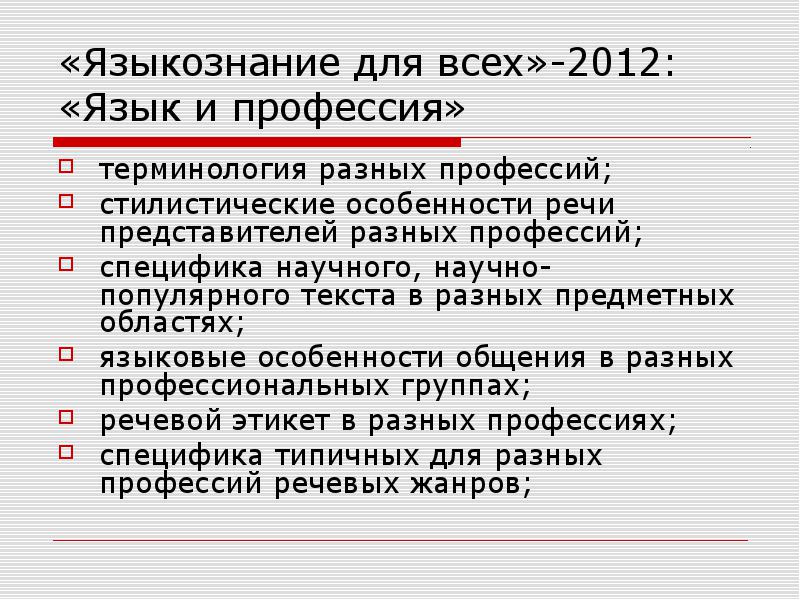
Conference directions 2012 (continued)
language portrait of representatives of different professions;
"language cuisine" of professions related to language;
manifestations of linguistic manipulation in the language of different professions;
reflection of the speech behavior of representatives of various professions in fiction;
comparison of the language of different professions, as well as scientific speech among different peoples.
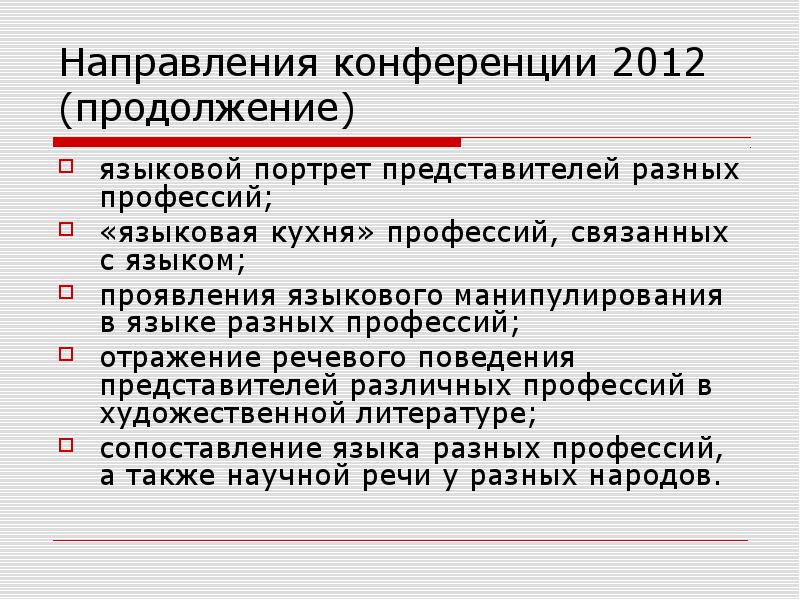
Direction-problem-theme of educational and research work
Direction research - a voluminous research space that can be set by different language levels, areas of language functioning or sections of linguistics
Problem -- a contradiction that needs to be resolved. The supervisor pushes the student to discover these contradictions through reflection, by analyzing the language material, by setting problematic tasks.
The problem in the study of the Russian language, which is clarified and concretized, the study of which is proposed on a specific language material, turns into topic research work.
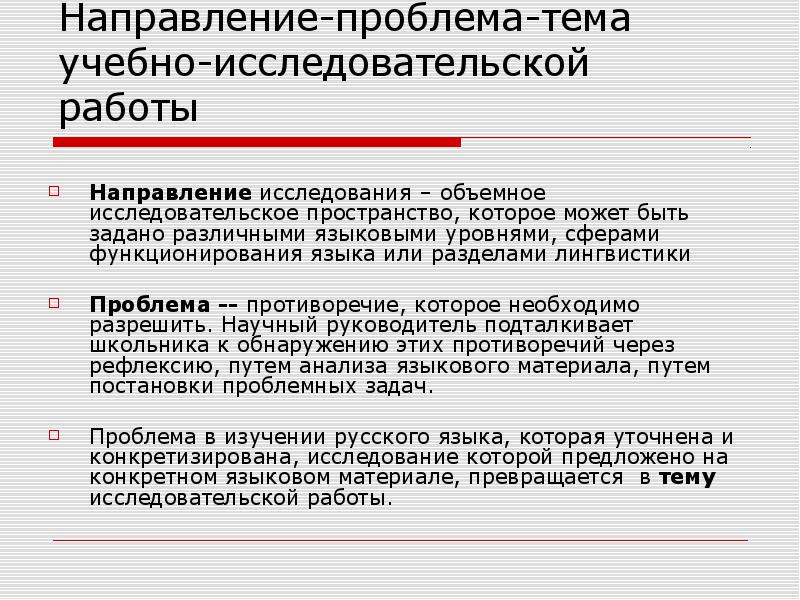
What is a "good topic"
Meets the goals of the development of the student's personality, i.e.:
chosen without coercion;
expands students' knowledge about the world and about themselves;
Due to the educational and scientific nature of the educational and research work of schoolchildren:
contains a problem that needs to be resolved;
follows the tradition of scientific linguistic research;
builds on knowledge acquired with basic education, deepens and expands it;
available to the researcher, i.e. corresponds to his age, knowledge, abilities;
feasible for the researcher in terms of volume and duration;
implements intersubject communications;
implies an ethical object and methods of research.
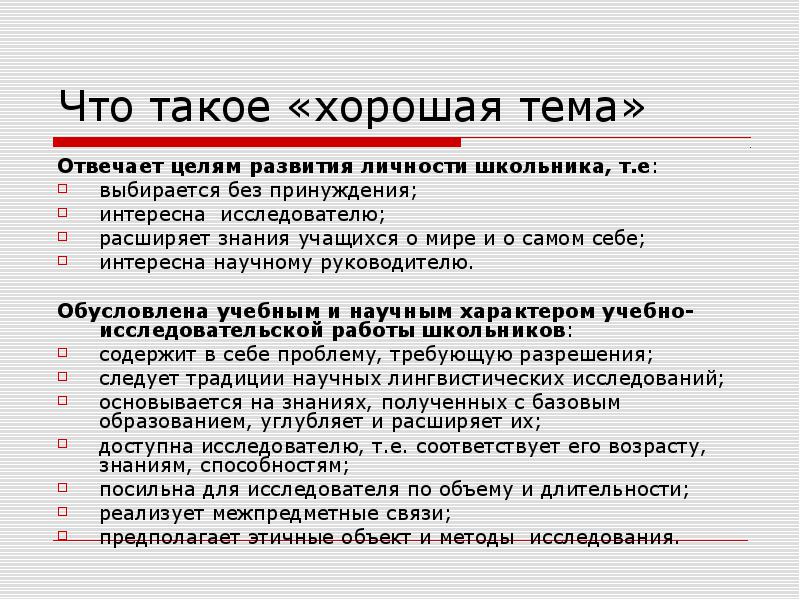
How to help the researcher to "meet" his topic?
Through the study of the linguistic interests of students;
During an elective or optional course on a specific topic;
Offering at the beginning of the year to choose topics from a list prepared by the supervisor
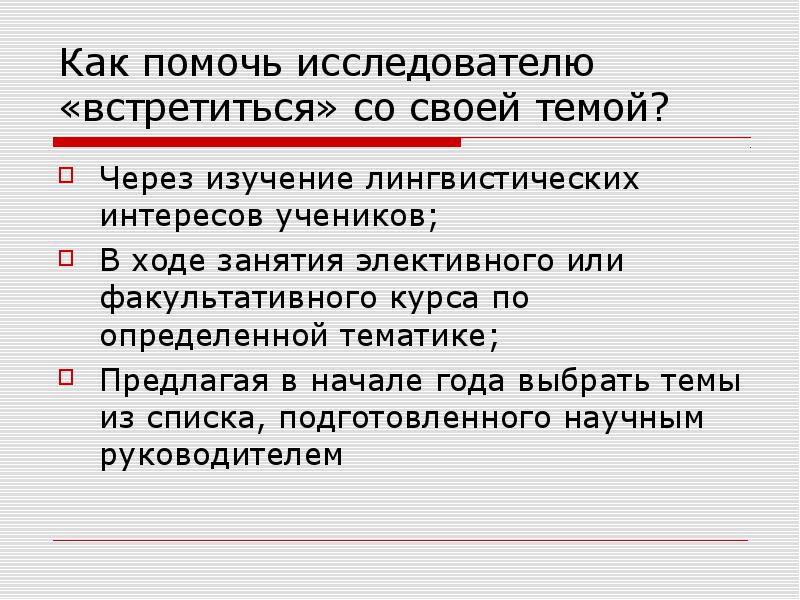
Several criteria for a well-formulated topic of school research in the Russian language:
the topic must contain a linguistic problem;
the topic should adequately reflect the content of the work, not be “wider” or “narrower” than it;
correspond to the scientific style of speech;
the topic should correspond to the goals and objectives of the work.
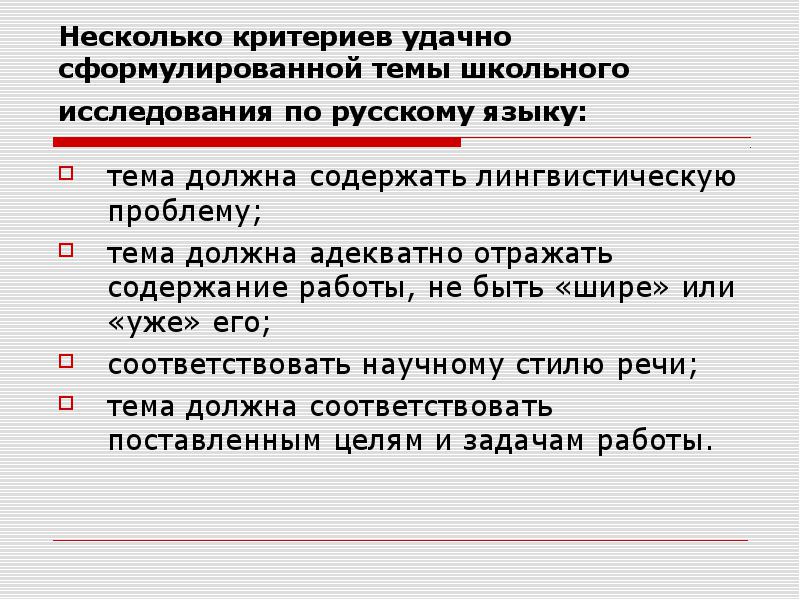
Neglect of the problematic often reduces the work to an abstract.
- Chancellery in journalism;
- Expressive means Russian language;
- The phenomenon of paronymy in Russian;
- Slang as an independent phenomenon in the Russian language.
- The role of A.S. Pushkin in the formation of the Russian literary language;
- The new style of Karamzin and its influence on the further development of the Russian national language.
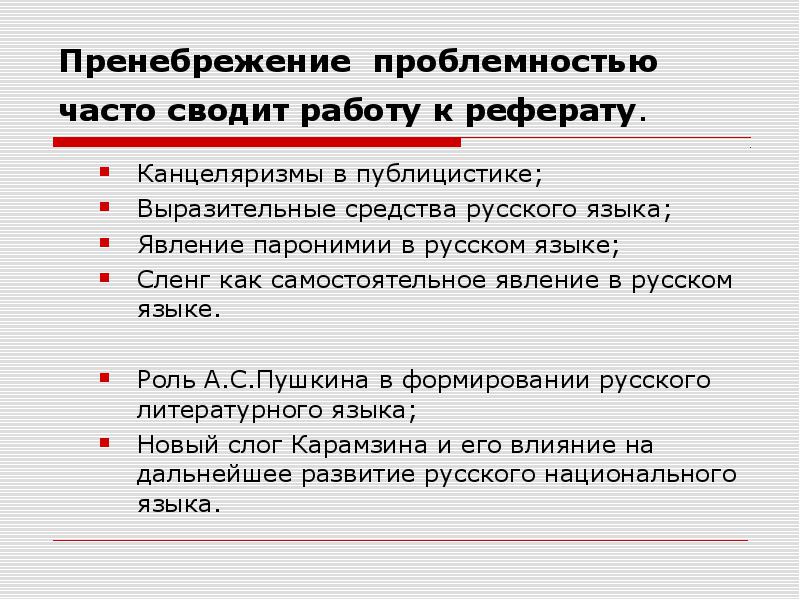
Too "broad" wording of the topic.
"Language and style of modern media";
"The Penetration of Anglicisms into the Russian Language in Recent Decades";
"International communication, language difficulties in communication between representatives of different peoples";
"Youth jargon";
"The language of modern advertising".
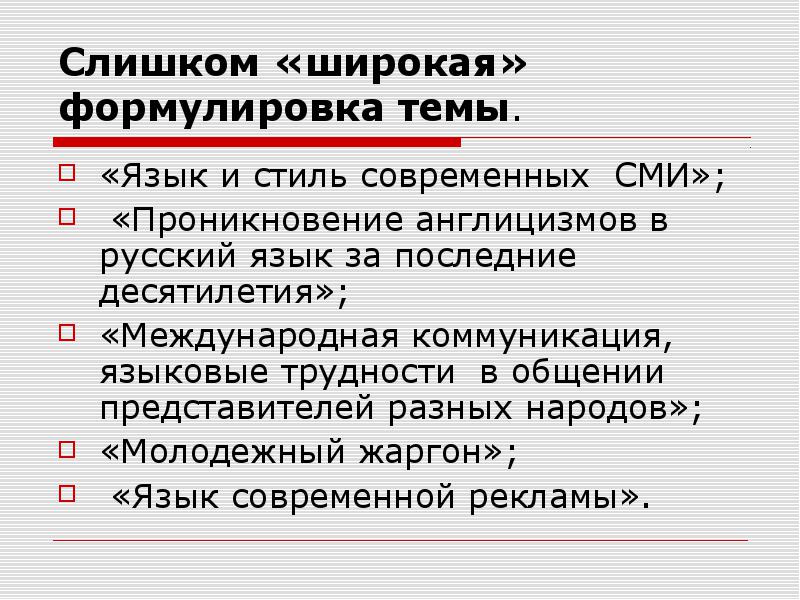
Deliberate scientism in the formulation of the topic
Verbalization of gender specificity in the dialogic speech of men and women;
Features of inversion as a stylistic means for expressing the author's thought in a hermeneutical approach;
Features of modern advertising. paragraph aspect.
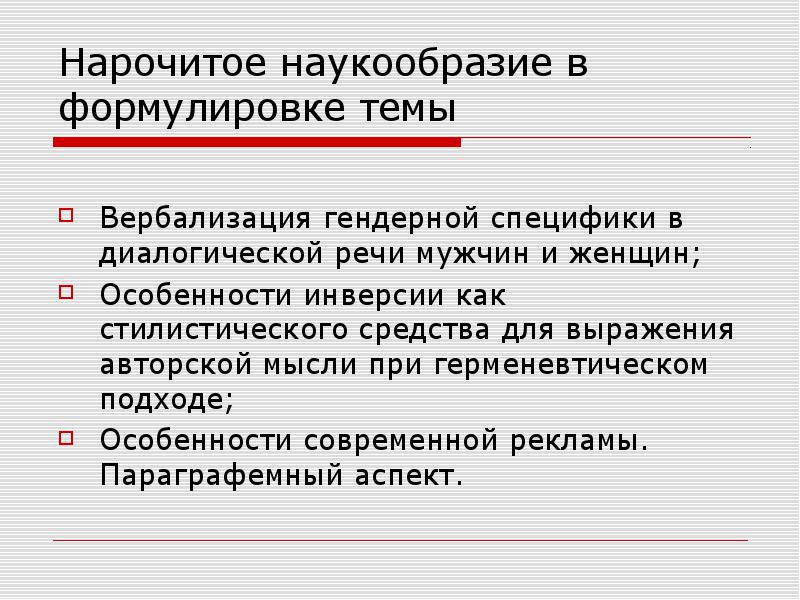
Other Kinds of Unwanted Topic Statements
"What's in a name?";
“How will our word respond”;
"There is no torment stronger than the torment of the word."
How do you live, slang?
Computer: increases literacy or hinders it?
English "hooligans" in Russian.
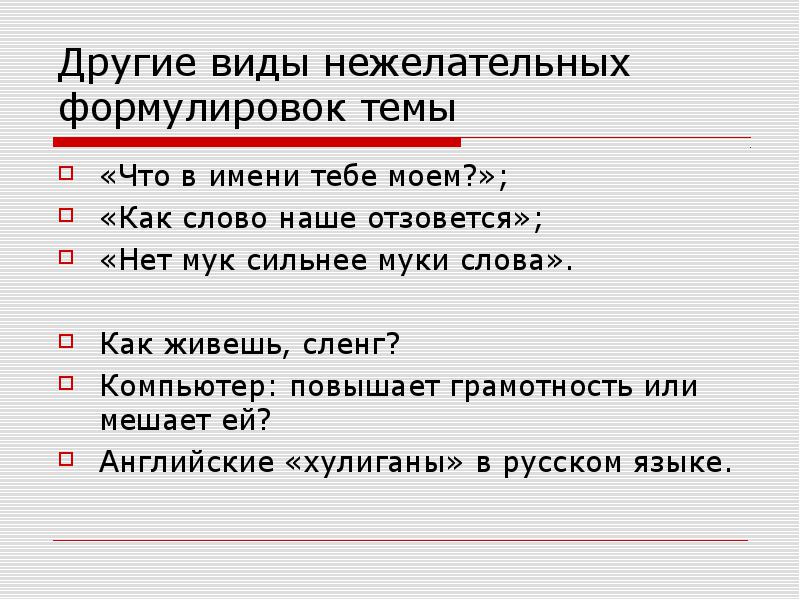
Reasonable compromise in the wording of the topic
"From green before awesome (synonymous series of the adverb "very" in the historical aspect)".
An example of provocative language:
“Shoelaces in a glass”, “Casting in the holding “Malina”, or negative phenomena in the speech of modern youth;
Everything in chocolate (a study of metaphorical expressions based on taste perception).
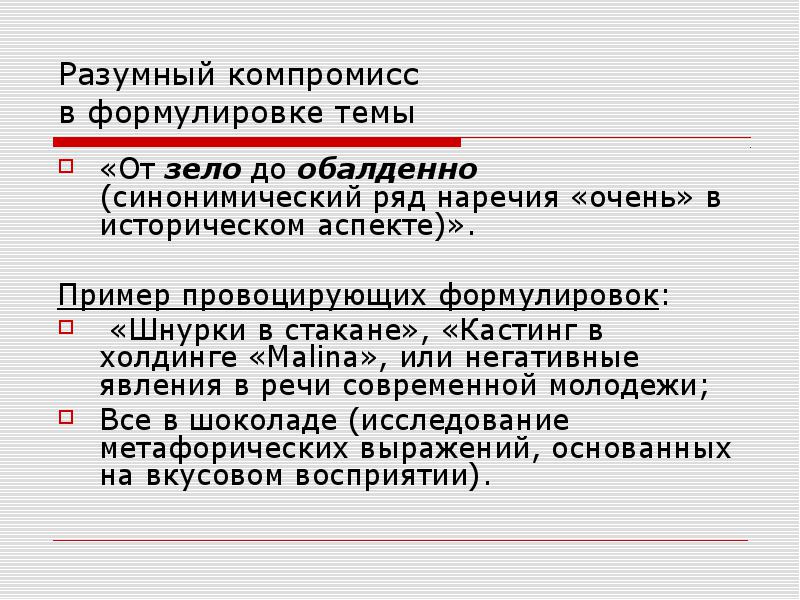
Topics 2012. Terminology of different professions
Comparison of medical terms (names of diseases) of the beginning of the 20th and 21st centuries
The variety of names of medical instruments and frequent errors in explaining their purpose
From the history of the term "reflection": orthoepic semantics
The concept of "insult" in modern jurislinguistics
Linguistic biology: new science and new terminology
Jazz and Rock Terms: Etymology and Spelling
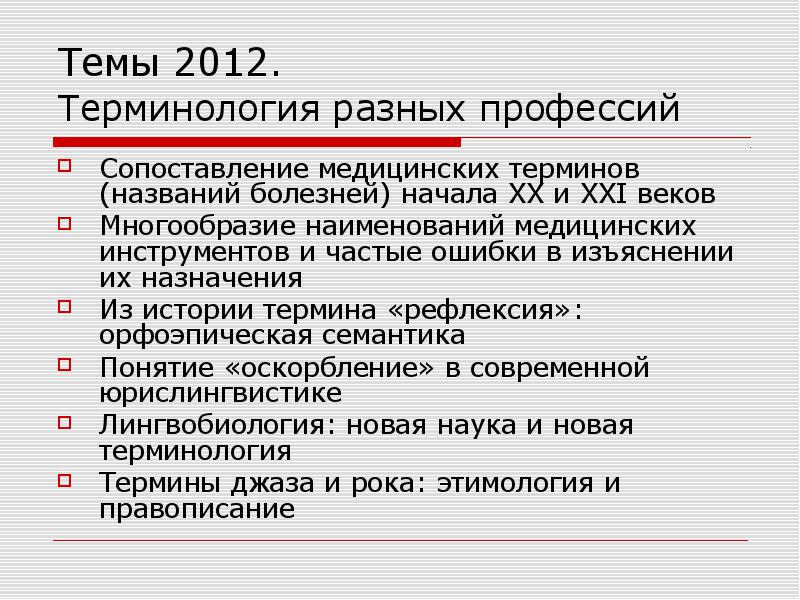
Features of the speech of representatives of different professions
Linguistic analysis of the speech of football commentators
The art of conducting an open air discussion (on the example of Ksenia Larina's program "Parents' meeting", dedicated to new educational standards, on the radio station "Echo of Moscow")
The main language techniques used by doctors to create professional jargon
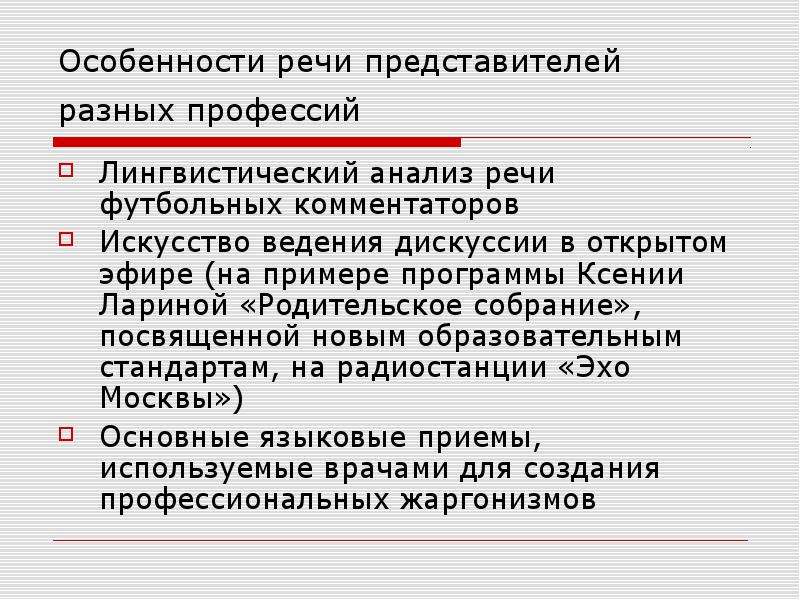
Linguistic features of communication in different professional groups
Features of the use of the pronoun "we" in the professional communication of a pediatrician
Phatic function of language in communication between beauty salon employees and clients
The Use of Diminutives in Professional Speech (on the Material of the National Corpus of the Russian Language)
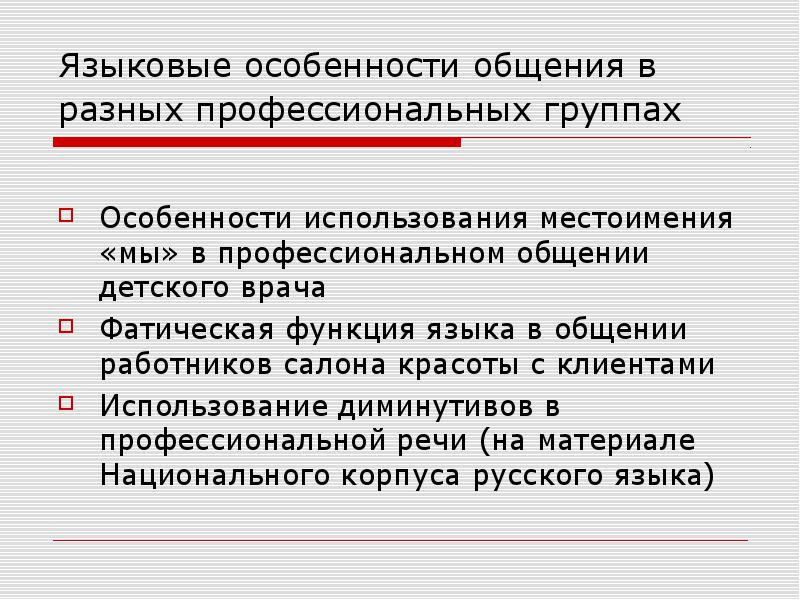
Specificity of speech genres in various professional fields
Case history genre: structure and stylist
Comparison of the genres "statement" and "petition" (according to archival documents)
Factor of redundancy / insufficiency of information in the texts of instructions for household appliances
Language techniques for creating provocative advertising in French and Russian
Civil passport as a text document of official business style
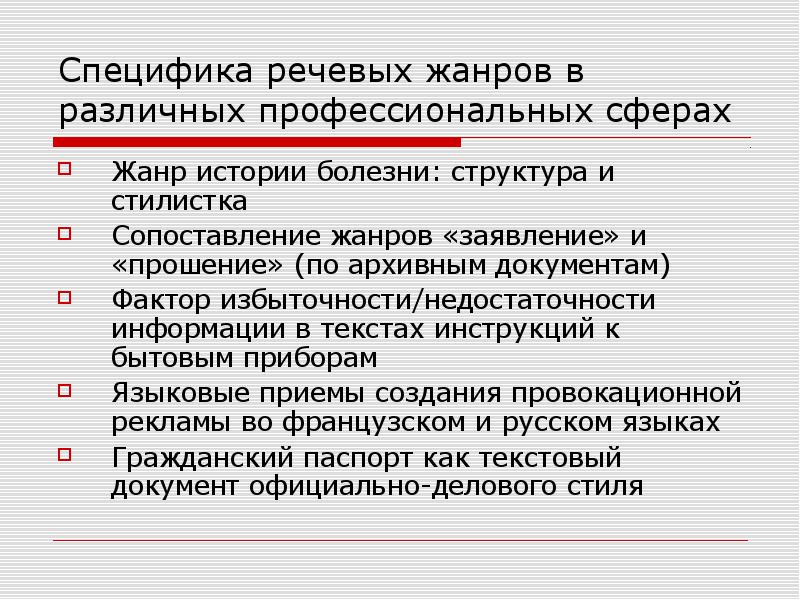
Speech etiquette in various areas of professional communication
Speech etiquette in the course "Business Russian" for future businessmen;
Features of introductory and final etiquette formulas in modern business electronic correspondence;
The choice of address in situations of short-term semi-official communication between the waiter and the client (in a metropolis).
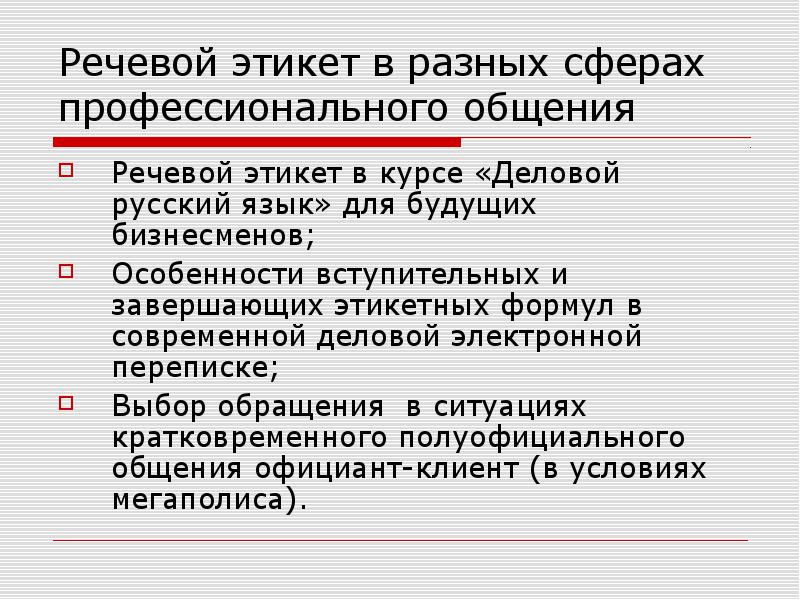
Linguistic portraits of representatives of different professions
Features of the structure of the teacher's questions in the lesson
turnover as if and others like him in the speeches of politicians and journalists
Peculiarities of conducting a dialogue by representatives of the humanitarian and technical professions (based on the materials of the collection "Russian Colloquial Speech")
History and structure of the genre of speech portrait in Russian studies
Language portrait of V.V. Zhirinovsky
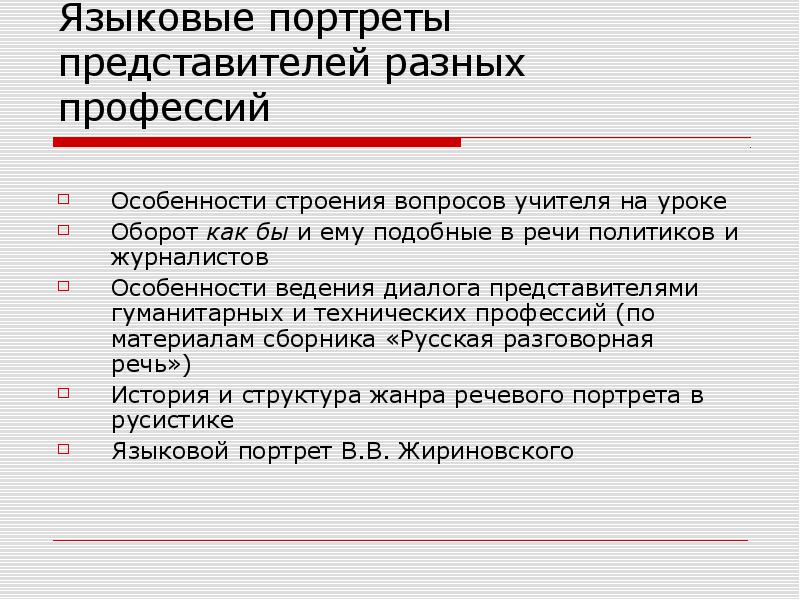
Language as a working tool ("language kitchen" of professions related to language)
Selection conditions and the usual combination of the words "citizen" and "master" depending on the author's position (on the material of journalistic texts according to the NCRL);
Features of stylistic means in the language of modern works of art (T. Tolstaya "Sonya", L. Ulitskaya "Sonechka");
Contextual synonyms in the lyrics of M. I. Tsvetaeva;
Occasionalisms in the work of I. Severyanin;
The use of "Odessisms" in the stories of I. E. Babel;
Improper direct speech in the prose of A. Platonov;
Features of the grammar and syntax of the speech of the heroes of the works of M. Zoshchenko;
The functioning of the novel by F. M. Dostoevsky "Crime and Punishment" in the novel by B. Akunin "F.M." as an implementation of the language game
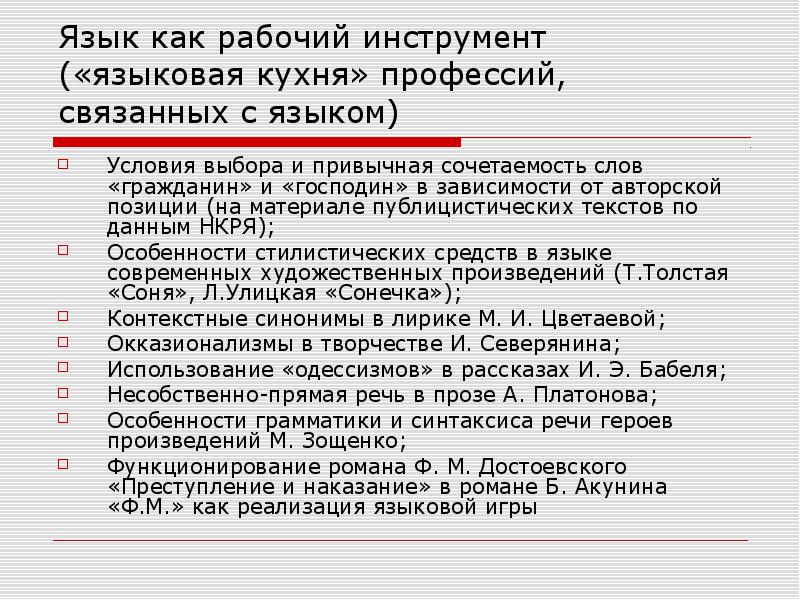
Manifestations of linguistic manipulation in the language of different professions
Euphemisms in journalistic articles on the topic of interethnic relations (on the material of the Izvestia newspaper for 2011;
Evaluative vocabulary as a method of linguistic manipulation in articles on the topic of "the catastrophe of 2012";
Methods of speech manipulation in advertising of medicines;
Formation of the image of political parties by means of print media;
Language means of creating a positive image of an educational institution in advertising texts (announcement, leaflet, article)
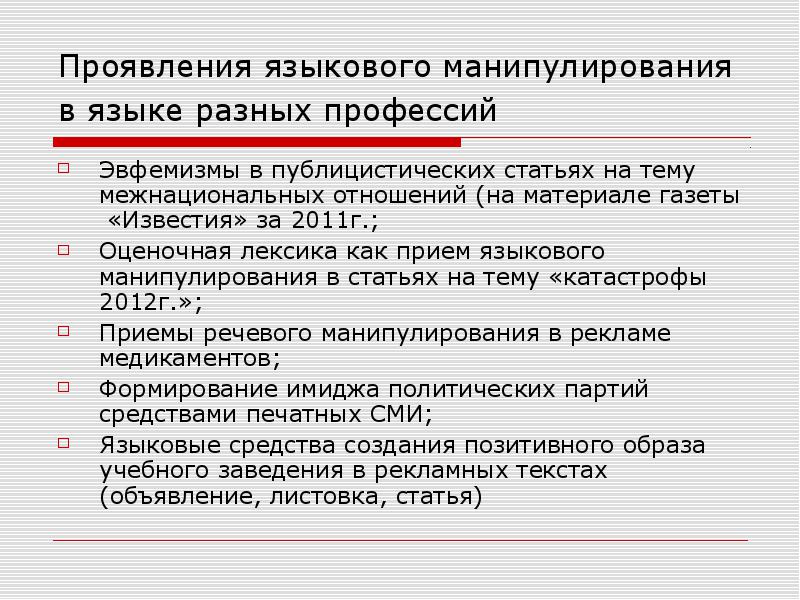
MBOU Krylovskaya basic comprehensive school
Project on:
Work completed:
Berestovaya Anna, 6th grade student
Head: Klimenko L.V.,
Research work on the Russian language on the topic: "Lexicon of students in grades 5-9 of my school."
Performed: Anna Berestovaya, 6th grade student of MBOU Krylovskaya Oosh
Project Manager: Klimenko Lyubov Vasilievna,
teacher of Russian language and literature
Subject: Russian language
Objective of the project:
Project objectives:
Determine what place is occupied by an uncommon vocabulary - dialectisms and professionalism in the speech of students.
Define jargon and slang.
Spend sociological research(questionnaire) among middle school students in order to determine:
reasons for the use of jargon by schoolchildren.
Organize the material.
Hypothesis: jargon -
Working methods and techniques: reading and analysis scientific literature, questioning, analysis of questionnaires, collection of frequently used profanity. The results of the research will be presented in the form of a report at the Russian language lesson.
Object of study: students of grades 5-9 MBOU Krylovskaya osh.
Introduction
1. Explanatory note
1.1. Area of study, object of study.
1.2.Relevance of the topic.
1.3. Formulation of the purpose and objectives of the study.
1.4. Research stages. Research methods.
2. Theoretical studies
2.1. Dialect vocabulary. What is the place of dialectisms among other groups of words? Are they in demand today?
2.2. Professional words in the vocabulary of students.
2.3. What is slang?
2.4. Youth slang.
2.5. Reasons for using slang.
3. Practical research
3.1. Conducting a survey of students in order to determine:
the circle of the most common slang words,
frequency of use of jargon,
clarifying the attitude of schoolchildren to youth slang.
4. Conclusion
5. List of used literature
6. . Applications
Introduction
From the first to the eleventh grade we study Russian. This is one of the most difficult school subjects. But no one doubts that it is necessary to study the Russian language. Who needs? Me, my friends, classmates, those who will come to school after us. To my children, grandchildren. To all of us Russian people. I sincerely believe that the Russian language is “great and mighty”, because it is the language of Pushkin, Gogol, Chekhov and other classics of Russian literature.
However, what do we hear today from the lips of modern youth? “You have a cool outfit”, “We had a great time today.” What is the "greatness" and "power" of the language of modern youth and schoolchildren? Fight them or accept them? This contradiction contributed to the emergence of interest in the study of students' vocabulary and determined the problem of my research.
1. Explanatory note
1.1. Field of study jargon and youth slang as a layer of vocabulary, closely related to the life of a modern student.
An object research- oral speech of students of my school
Research Base– students of grades 5-9
MBOU Krylovskaya basic comprehensive school.
1.2. Relevance:
- limited vocabulary is common among schoolchildren, but its origin is not sufficiently represented in school textbooks of the Russian language;
- youth slang and jargon - phenomena that are present everywhere, and acquaintance with them will help to expand knowledge about the lexical composition of the language and deepen knowledge of the Russian language as a whole;
- the study of limited vocabulary allows you to connect linguistic knowledge with life, increases observation and teaches you to find interesting and unexplored things next to you;
- work on the topic allows you to find out the attitude of schoolchildren to youth slang, as well as to identify the reasons for the use of such vocabulary by students.
1.3. Purpose of the study: to analyze the speech of modern schoolchildren from the point of view of their use of commonly used and limited vocabulary and determine ways to replenish vocabulary students of my school.
Hypothesis:
limited vocabulary prevails in students' speech: slang, jargon - frequently used means in the speech of schoolchildren, their use is associated with the desire to stand out among people, to be modern; slang words make up semantic groups associated with the life and work of schoolchildren. Is it so?
Tasks:
Determine the composition of groups of commonly used vocabulary in the speech of schoolchildren.
Define "slang".
Conduct a sociological study (questionnaire) among students in grades 5-9 of the school in order to determine:
Do schoolchildren use dialect and professional words in their speech;
The circle of the most common words of youth slang and slang words;
The reasons for the use of slang and jargon by schoolchildren.
Analyze the results of the survey and place the conclusions in diagrams.
Draw conclusions about the research topic.
Make a computer presentation.
1.4. Research stages:
Study of scientific literature, selection of theoretical material.
Conducting a survey, processing the results.
Project writing.
Creating a computer presentation
Research methods:
- method of collecting information (study of popular science literature, observation);
Collection of vocabulary;
- questioning;
-analysis, comparison;
- statistical studies(calculation, calculations).
2. Theoretical research.
2.1. Dialect vocabulary. What is the place of dialectisms among
other groups of words? Are they in demand today??
The vocabulary of the Russian language in terms of the scope of its use can be displayed in the table:
VOCABULARY
If the word in modern Russian
used freely,
unlimited
not included freely
used vocabulary
used in a certain field of activity (science, office work, etc.):hyphen, rasp, overlap., scalpel, easel
used by a certain group of people to name objects that have in the literary languagetheir names:packed (rich), wheelbarrow (car), comp ( a computer )
used in a certain territory:
golitsy (mittens), beetroot (beets), gai (forest)
Common vocabulary
Professional vocabulary
Dialect vocabulary
Many words of the Russian language are known to all the people and are used by everyone. These words are commonly used, for example : water, earth, sky, bird; green, blue, long; walk, think, talk.
But there are words in Russian that not everyone knows and uses in their speech. it uncommon the words. Non-common vocabulary includes dialect, professional, slang words and words of youth slang.
Dialect vocabulary includes words, the distribution of which is limited to a particular territory. They have phonetic, morphological and syntactic features, as well as specific vocabulary. Based on conversations with parents, grandparents, communicating with my peers, I came to the conclusion that there are dialectisms in the speech of students from my school. They penetrate into the speech of schoolchildren through communication with elders. In an official setting (in the classroom), the guys tend to speak the literary language, and at home, some of them also use the dialect. These are words like : kurchat (chickens), purse (basket), cybarka (bucket), beetroot (beetroot), dit (child) and others. However, there are not so many dialect words in the speech of our schoolchildren. As a result of the survey, it was found that dialect vocabulary is very rare in the vocabulary of students in grades 5-9. I have identified several reasons for the rare use of dialects:
Some argue that dialectisms are the vocabulary of the older generation, the elderly;
Others believe that these days it is irrelevant, funny and, as the guys say, “old-fashioned” to use dialectisms;
Some answered “I don’t know” what dialectisms are.
Of course, it is a pity that in our speech there are fewer and fewer dialect words, but what expressiveness, emotionality they give to the language! For example, the story of M.A. Sholokhov "Nakhalenok". In this story, the writer uses a lot of dialect words used by the Don Cossacks. And when we read how Mishka or his grandfather, mother or father says, it’s funny to us, and we are transported to the Cossack village of the beginning of the last century. And I think that we should not completely forget those words and expressions, the language that our grandfathers and great-grandfathers used.
The meaning of the incomprehensible dialect word can be learned from explanatory dictionary»
2.2. Professional words in the vocabulary of students.
Special vocabulary of limited use includes terms and professionalisms. Words related to the peculiarities of the work of people of a particular specialty, profession, are called professionalism. For example , hyphen, carburetor, stamp, turnover, scalpel .
Term - is the scientific term for the concept (syntax, inequality, climate, island, monitor, subject and others.
In the speech of parents engaged in different types activities, there are names of different objects. From the lexicon of parents, such words pass into the children's lexicon. As a result of the survey, some professional words and expressions that students know and use in speech were identified. For example, , battery, radiator, gearbox , crop rotation, agricultural technology , medicines , pediatrician, oculist, ENT.
2.3 What is slang?
There are several definitions of slang.
Slang- the speech of any group united by common interests, containing many differences from common language words and expressions that are not fully understood by others.
Slang- this is a variant of colloquial speech that does not coincide with the norm of the literary language. What is slang for?
Slang makes speech more concise, emotionally expressive, the speaker can most fully and freely express his feelings and emotions. (Let's compare two expressions. In bookish, literary language: "I have a strong pleasant feeling from this song." In slang: "I just trudge over this song!") The most successful definition of slang, in my opinion, is this:
Slang - words that live in modern language full life, but considered undesirable for use in the literary language.
2.4.Youth slang
Youth slang- a social dialect of people aged 13 - 30 years, which arose from opposing themselves to the older generation and the official system, and is distinguished by colloquial, and sometimes rudely familiar coloring
In my opinion, the concept school slang- a kind of speech that does not coincide with the norm of the literary language, used by a narrow circle of people united by a common interest, occupation, position in society. From this definition it follows that slang refers to the vocabulary of a limited scope of use and
used primarily in oral communication. Slang was, is and will be in school vocabulary. It cannot be banned or abolished. It changes over time, some words die, others appear, just like in any other language. Of course, it’s bad if slang completely replaces normal speech for a person. But it is impossible to imagine a modern student without slang at all. The main advantages here are expressiveness and brevity.
It is no coincidence that slang is currently used in the press and even in literature (and not only in the detective genre) to give liveliness to speech. Even high-ranking statesmen use in their speeches slang expressions. Therefore, one cannot treat slang as something that only pollutes the Russian language. It is an integral part of our speech.
2.5 Reasons for using slang.
Slang is a kind of non-literary speech. Most often, slang is used by teenagers and young people.
Suppose that slang in students' speech is a means of everyday speech. The question arises: why do schoolchildren speak this way, why has slang become firmly established in everyday life?
To answer this question, I conducted a language study: questioned the students, conducted observations (both in the classroom, and during breaks, and outside the school). I found out that students in grades 5-9 of my school actively use slang in their speech, which is characterized by a bright expressive and stylistic coloring, therefore it easily turns into colloquial everyday speech, into vernacular.
In the questionnaires, I asked them to indicate the words that the guys use most often. The analysis of the research work and my observations made it possible to identify the following semantic groups of slang in the speech of students:
| Group name | ||
| Body parts | rakes, blanks (hands), pack, tower (head), countersinks, walleye (eyes), mitten (mouth), locators (ears); |
|
| Words denoting people by profession | teacher (teacher), carrier (driver), historian (history teacher), cop (policeman); |
|
| Appliances | box, telly (TV), mobile phone, sotik (mobile phone), computer (computer), video recorder (VCR), dividishka (DVD); |
|
| Transport | motik, motak (motorcycle), great (bicycle), wheelbarrow (car), nine, ten, fifteen (car models) |
|
| Words denoting people by kinship | ancestors, relatives, parents (parents), papan, folder (dad), maman (mother), sister (sister), brothers (friends), brother, brother (brother), men (boyfriend) |
|
| homework ( homework), deuce (score "2"), nickel (score "5"), control |
||
| Food | hawka, hawal, hawchik, zhrachka (food), shop, shop (shop), canteen (canteen) |
|
| grandmas, loot, bucks, thing |
||
| Evaluation words | cool, cool, lafa, nishtyak, zashib, buzz (good, excellent), cool (interesting), cool (excellent), a hundred pounds, specifically (exactly), by nature, real (true), finally (admiration), shameful, dumb, sucks (bad, ugly), lucky (lucky), bullshit (very simple) |
|
| get off, get off, get off, get off (get away, leave me alone), bazaar (talk), pin (joke), load (annoy), break off (failure), go crazy, stunned (surprise), stir up, chop (deceive), tear off (get ), stretch out (rest), bastard, trudge (very good), slip away, wind up (run away), stare, stare (look), smile (smile), load (annoy, pester), sew, score (kill), disappear, slip away (leave), run over (threaten); |
||
| Words denoting people by their quality of character | rat, ram, pig, dog, elk, goof, loshara, brake, six, woodpecker, goat, schmuck, tall, cow |
As a result of the study, it was found that students actively use slang in their speech. The use of non-literary vocabulary is most often observed when schoolchildren communicate with each other and when expressing any feeling (surprise - cool!, delight - wow!, irritation - fuck off, etc.) But it is interesting that sometimes without context , very often these words and expressions are accompanied by facial expressions and gestures. Because without them it can be difficult to understand the meaning of the statement. This is confirmed by the fact that 7th grade students could not find all the matches for slang words and expressions (for example, the word "crazy" without being applied to some situation turned out to be difficult to explain). Depending on the situation, words can express various, even opposite, emotions: disappointment, irritation, surprise, joy. For example: Well, damn it, you give! (surprise), Don't bother the damn thing (irritation), Damn it! (delight), etc. Students believe that the emotions and feelings that overwhelm them cannot be expressed literary language(one of the reasons for the use of slang).
3. Practical research
3.1. Conducting student surveys todefinitions
The question that I asked the students seemed natural to me: “Why do you use slang?” It turned out that the most popular answers were "It's fashionable, modern", "Help to assert themselves". I realized that the guys, using slang, follow the fashion, they are afraid to seem ridiculous, a "black sheep" if they start speaking in a literary language. In addition, there is an element of self-affirmation, a kind of protest against the surrounding reality.
The second most popular answer is: "Slang makes it easier to understand for friends." Several people responded that slang gives liveliness and humor to speech. To the question: “When you grow up, will you use slang?” Many answered no. This suggests that the use of slang by adults is unacceptable, in their opinion, and at the same time, it seems to confirm the thesis that slang is to a greater extent a youth phenomenon. At the same time, the observation on the qualitative use of slang seemed interesting to me: fifth-graders and sixth-graders most often use words expressing emotional assessment (cool, cool, cool) and words related to school life (physical, liter, German) high school students expressed the idea that when they are unfamiliar people (adults, teachers) try not to use slang in their speech.
From conversations with adults, I found out that before, when they were in school, slang was present. They named such words: damn, state assessment, bullshit, spur, but the use of these expressions was low, these words were “not thrown” openly, it was considered shameful to pronounce an unliterary word aloud in front of an adult. Our school teachers know a lot of words modern slang, some sometimes use them as a joke.
4. Conclusion.
In my work, I tried to explain the reasons for the use of slang as an element of students' everyday speech. The children of my school actively use non-literary vocabulary in their speech. The study of non-common vocabulary in speech proves the presence of slang, dialect, professional, slang words and expressions in the vocabulary of schoolchildren.
Most of all in speech, the guys from my school use slang as an expressive tool, considering it fashionable. Thus, they want to create their own world, different from the world of adults. It was also found that the use of slang is a kind of protest against the "gray" reality, it is an element of self-affirmation, the desire for independence and independence. An important factor is the influence of the media on the speech of the student. In addition, it was found that schoolchildren treat slang as a temporary phenomenon in their speech. Some of the students did not think at all about how they speak.
I found out that slang has existed for a long time (since the time of our mothers and grandmothers), but the degree of use of this phenomenon in the language has increased in our time. Therefore, the hypothesis that I put forward is correct - in the speech of students, limited vocabulary prevails. In the first place - slang, jargon, and dialectisms and professionalism are very rare. So, our task is to learn how to use this vocabulary appropriately in accordance with the situation of communication. Know about the impossibility of its application in normalized speech. To get rid of the negative influence of restricted vocabulary. It is necessary to know well the norms of literary language - norms pronunciation, stress, inflection, pronunciation.
6. List of used literature
S. I. Ozhegov. - Dictionary of the Russian language. - (edited by N. Yu. Shvedova), - M .: "Russian language", 1989
V.V.Volina I know the world, Russian language.- M.: AST, 1998.
3. D. E. Rosenthal M. A. Telenkova - Dictionary linguistic terms(electronic variant).
4. L.I. Skvortsov. Jargons / Russian language: encyclopedia. - M., 1979.
5. O.L. Soboleva. Student's handbook. 5-11 grades. Russian language / M.: AST. 2003.
6. V.V. Sokolova. Culture of speech and culture of communication. - M .: Education, 1995.
7. Internet materials
7. Applications
Questionnaire for students:
What is youth slang?
Do you know the words of youth slang? (Not really)
Do you use these words in your speech? (often, rarely, never)
Underline the ones you use most often.
For what purpose do you use them?
a) You think that it is fashionable, modern.
b) Needed in speech to connect words.
c) Help to overcome the lack of words in my speech.
d) Make speech clearer to friends.
d) Help to assert themselves.
e) Give your speech liveliness, humor.
7. Could you do without slang words and expressions?
c) I didn't think about it.
8. Do you try to do without them?
c) I didn't think about it.
| Answer options | |||||
| Didn't think about it |
The answers show that with age, students understand that their speech is wrong and try to correct it. At the same time, students do not think about how they speak.
9. When you grow up, will you use slang?
c) I didn't think about it.
A selective survey of students in grades 6 and 7 revealed their attitude to the use of jargon. A total of 14 people were interviewed.
When asked why students use jargon, the data presented in the table were obtained:
| Fashionable, modern | ||||
| Needed in speech to connect words | ||||
| Make speech clearer | ||||
| Something other |
Having considered this issue, we can draw the following conclusion: the main reason for using jargon is to organize communication among peers, and this is also a “pursuit” of fashion and modernity. The everyday speech of schoolchildren is full of jargon and it is almost impossible to eliminate them. However, it must be remembered that slang vocabulary is not the vocabulary of a cultured, educated person, and one should always remember in what area of speech communication it is acceptable for use.






